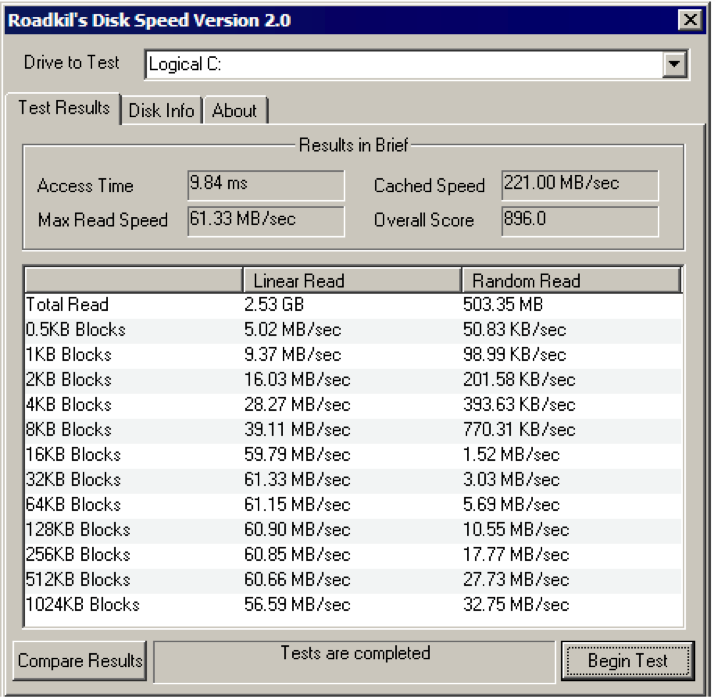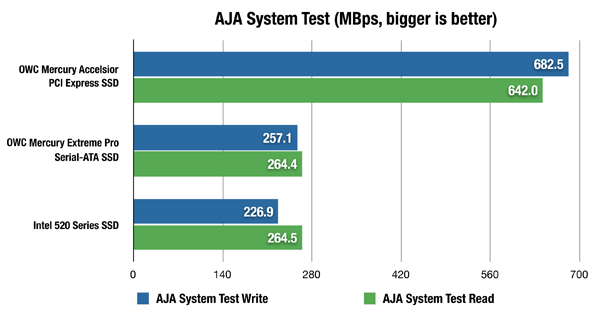Drive Speed Test For Mac
Blackmagic is now faster enough to rate internal SSD speeds, even the Startup Disk
Blackmagic has been updated to adequately report the speed of SSD devices.When Blackmagic tries to read the Startup Disk, you get the message that the device is not writeable, hence you cannot rate the the transfer rates of the drive.I found a workaround that will report the rates of the Startup Disk. Its quite simple. Create a disk image (.dmg) using the disk utility specifying file->new image->blank image. Make it big enough for Blackmagic to work with (7+ GB) and name it what you will. Mount the volume (if it is not already mounted).In Blackmagic select the disk image mounted. Since the “volume” is on your Startup Disk, you will see how fast it drive is. On my 2016 MacBook Pro, I am seeing speeds like 1,000+ MB/s write, and 1100+ MB/S read. I have tried this on my older mackbooks with SSD and they do scale down as the device is older. On an older MacBook Pro the rates I see are 500 MB/S both read and write, as you would expect.I have run Blackmagic on USB 2, thumb drives, USB 3, and USB C devices to see if I’m getting my money’s worth. You can easily detect when a device is performing subpar and, and with the spinning disk, you can see is transfer speeds deteriorates over time.
With today’s demanding applications on our computers, it’s important to ensure that there are no slow-downs or bottlenecks in the system. One area that has traditionally been an issue is the read and write speed of hard drives.
Drive tests include: read, write, sustained write and mixed IO. RAM tests include: single/multi core bandwidth and latency. Reports are generated and presented on userbenchmark.com. Identify the strongest components in your PC. See speed test results from other users. Compare your components to the current market leaders. Seagate SeaTools. Works from both inside and outside of Windows. Completely free.
How To Test My Hard Drive Speed

The advent of the SSD — or solid state drive — has led to a great improvement in read and write speeds (especially in comparison to older mechanical HDDs), but it’s still crucial to test transfer speeds to determine how efficient a system is and whether there might be any hardware or software problems.
And as we use more and more storage solutions on a daily basis, including USB storage, it’s also important to benchmark these devices too.
In this article we’ll examine the best speed test and benchmark software tools for your computer’s hard drive, supporting either SSD or HDD types of hard disks.
The ranking in the list below is in no particular order.
Table of Contents
1) ATTO Disk Benchmark
This is one of the leading benchmarking tools from a respected name. It will work on both HDD and SSD as well as RAID array disks. This makes it ideal for businesses and large companies that need to determine where there might be transfer speed issues in their systems.
Using a convenient interface where all of the relevant information is available in one window, ATTO Disk Benchmark remains a firm favorite with network technicians in the industry. It works on Windows OS but also there is a macOS version as well.
2) HDTach
What makes this application different from most other disk benchmarking tools is that it tests transfer speeds on all areas of the drive.
In hard disks, the data transfer speeds on the outside of the physical disk platter are higher than transfer speeds on the inside. This can distort the readings of transfer speeds.

What HDTach does is to use a VXD kernel mode to bypass the file system. It then accesses areas all over the disk and logs the transfer speeds in a file.
This results in a more accurate report on hard disk performance and provides much more relevant information.
3) MiniTool Partition Wizard
The MiniTool Partition Wizard is primarily aimed at users who need to resize, move, split, and format partition areas of their HDDs or SSDs. This allows the installation of multiple operating systems, for example.
It can also test disk transfer speeds on all drives, including both HDD and SSD. This makes it the ideal multi-purpose disk tool for system administrators and even power home users who need such an advanced tool.
The other good news is that it comes in a free edition, which does include the disk speed benchmarking tools.
4) UserBenchmark
This free, attractive tool allows for not just testing of hard drive and SSD speeds but also RAM, CPU and GPU speeds.
It will even test the transfer speeds of attached USB storage. This makes it the ideal companion for home users who are curious about system performance or need to identify a potential bottleneck within their systems.
It is a small download, is free to use, and presents all of the information in a very attractive interface that features graphical elements and color-coded benchmark logs.
Overall, this is a highly attractive piece of software that has proven to be very popular with many types of computer users.
5) Crystal Disk Mark
This small speed benchmarking utility is for users who just need to see speeds presented in a very simple way. Unlike other utilities, Crystal Disk does not contain any extra bells and whistles. What is unusual is that it also features an anime-themed edition called the Shizuku Edition.
This may suit people who just need a simple, free benchmarking utility that won’t take up much space and won’t confuse them with too much information on the screen.
6) My HDD Speed
Available from the long-lived and much-loved Majorgeeks website, this tiny utility allows people to see the speed performance of their HDDs in real time. Once again, this software does not contain too many extras that could become confusing for a user. It does one thing and does it very well.
At less than 150 KB, this is a tiny program that may suit users just looking to test their system speeds.
7) Anvil’s Storage Utilities
As the world is moving to better and bigger solid state storage, more benchmarking tools are supporting them.
Anvil’s Storage Utilities has been designed to test both mechanical hard drives and SSDs but it really does do a great job on solid state drives specifically.
If you or your company have moved entirely to solid state drive storage, this is a tool that will run diagnostic and custom speed tests. Because it has been designed with solid state drives in mind, it is the ideal tool to use.
One feature that most other tools do not have is that Anvil’s tool displays both MB per second and IOPS when measuring the speed of disks.
8) AS SSD Benchmark

As with Anvil’s Utilities, this tool has been designed with solid state drives in mind. As we are now using more of them at home and in business, it’s also important to have a speed benchmarking tool that can provide up-to-date, relevant information on transfer speeds for this relatively new technology.
AS SSD Benchmark is small and comes in a free edition that allows anyone to get the most out of it before deciding to donate to support the developers. Since it doesn’t even need to be installed on a system and can be executed from a single file, this makes it ideal to carry around on a portable drive.
Like the previous tool, this one also measures the disk speed using MB /sec and also IOPS (input-output operations per sec).
9) jDiskMark
jDiskMark is a benchmarking tool that has been written in Java. Some years ago, Java was all the rage in the IT community but it has since become an outlier.
Having said that, the real advantage to Java is that it is cross-platform. This means that jDiskMark will even run on Linux and BSD-based systems as well as Windows.
It may be a small download, but jDiskMark features an easy-to-understand traditional interface that provides all of the information necessary.
10) PassMark Advanced Disk Test
This no-fuss benchmarking solution is ideal for those who need an uncluttered view of disk speed tests. It supports multiple threads; testing on different hard drives and SSDs can be done simultaneously using threaded processing.

This fast, efficient processing makes it the ideal choice for large-scale environments where testing of multiple storage sources needs to be done, including HDD, SSD, USB storage, RAID set-ups, SCSI storage, and networked drives.
11) Parkdale
Have you ever wanted to check the transfer speed of your CD-ROM drives in addition to your hard disk? Parkdale allows you to do that as well as test and benchmark speeds of hard disks, solid state drives, and even networked drives and servers.
Hard Drive Speed Test For Mac
What makes this small tool interesting is that all of that speed data can easily be compared to their benchmark test results page.
All you need to do is enter the device you’ve tested and then the value. This will log it and then compare it with other results that people have submitted, making it very easy to determine what speeds are normal.

12) Roadkil’s Disk Speed
If you have an older system that is before Windows 10, this tiny disk benchmarking tool may be for you. The interface is a no-fuss, no bells and whistles affair. It has the look of a Windows XP tool and in reality, it is possibly better for older systems.
13) HDDScan
If you have concerns about the overall health of your drive, the free HDDScan software is worth downloading.
As well as setting the speed of hard drives, USB storage, and solid state drives, it will also access and display S.M.A.R.T information.
This provides an indication of the overall physical health of the drive, including bad sectors and bad blocks. This is useful for knowing when a drive might be about to fail.
Whether you are experiencing a slow system, your programs are slow to start up, or you think that your attached drives could be about to fail, this tiny piece of free software can provide some peace of mind. It may even end up saving you from the loss of valuable data.
14) AJA System Test
Available for both Mac and Windows, this attractive piece of software is ideal for people who need an industry-recognized tool.
If you are in the graphic design or media industry and you rely heavily on computers for daily work, this tool is ideal.
All of the relevant information is presented in an attractive single-screen format with large color-coded graphics and easy-to-find options.
If you depend on fast PCIe transfer speeds, AJA System Test can also test the input-output speeds of these industry-standard cards.
Just bear in mind that you’ll need to pay for the full version to access this additional functionality.
Conclusion
As our Internet connection speeds have increased and our software applications have become bigger and more demanding of resources, it’s important to understand how fast your hard drive and solid state drive transfer speeds are.
This has implications in business because any slowdown can affect performance and delivery on a daily basis. This is why disk benchmarking tools are so important to the system administrator and even the curious home computer user.
Related Posts
